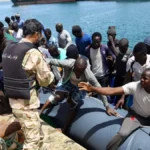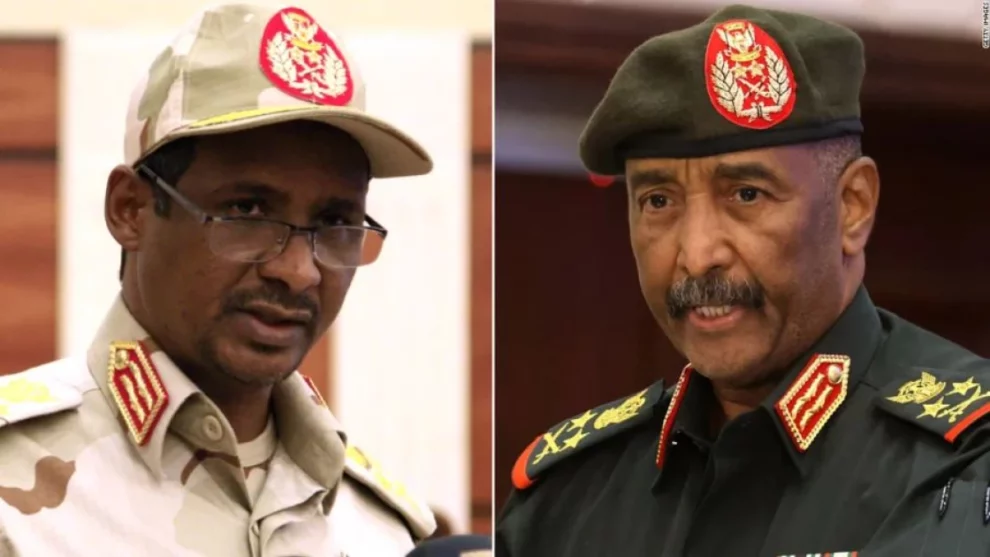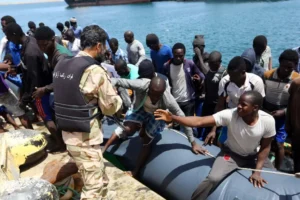Fierce fighting across Sudan has left hopes for a peaceful transition to civilian rule in tatters.
Forces loyal to two rival generals are vying for control, and as is so often the case civilians have suffered the most, with dozens killed and hundreds injured.
Doctors’ organizations and several eyewitnesses said medical facilities were being bombarded with military strikes in targeted attacks, as clashes between the Sudanese army and paramilitary ramped up for the third day. Both sides later denied shelling hospitals, in comments to CNN.
Here’s what you need to know.
A power struggle is at the center of the fighting
At the heart of the clashes are two men: Sudan’s military leader Abdel Fattah al-Burhan and the commander of the paramilitary Rapid Support Forces (RSF), Mohamed Hamdan Dagalo.
Until recently, they were allies. The pair worked together to topple ousted Sudanese President Omar al-Bashir in 2019 and played a pivotal role in the military coup in 2021.
However, tensions arose during negotiations to integrate the RSF into the country’s military as part of plans to restore civilian rule.
The key question: who would be subordinate to who under the new hierarchy.
These hostilities, sources told CNN, are the culmination of what both parties view as an existential fight for dominance.
Sudan is no stranger to upheaval
It is difficult to overstate how seismic Bashir’s overthrow was. He had led the country for nearly three decades when popular protests that began over soaring bread prices toppled him from power.
During his rule, South Sudan split from the north while the International Criminal Court issued an arrest warrant for Bashir alleged war crimes in Darfur, a separatist Western region.
After Bashir’s ouster, Sudan was ruled by an uneasy alliance between the military and civilian groups.
That all ended in 2021, when the power-sharing government was dissolved by armed forces.
The RSF has a controversial past
The Rapid Support Forces are the preeminent paramilitary group in Sudan, whose leader, Dagalo, has enjoyed a rapid rise to power.
During Sudan’s Darfur conflict in the early 2000s, he was the leader of Sudan’s notorious Janjaweed forces, implicated in human rights violations and atrocities.
An international outcry saw Bashir formalize the group into paramilitary forces known as the Border Intelligence Units.
In 2007, its troops became part of the country’s intelligence services and, in 2013, Bashir created the RSF, a paramilitary group overseen by him and led by Dagalo.
Dagalo turned against Bashir in 2019, but not before his forces opened fire on an anti-Bashir, pro-democracy sit-in in Khartoum, killing at least 118 people.
He was later appointed deputy of the transitional Sovereign Council that ruled Sudan in partnership with civilian leadership.
The two rivals mirror each other
Burhan is essentially Sudan’s leader. At the time of Bashir’s toppling, Burhan was the army’s inspector general.
His career has run an almost parallel course to Dagalo’s.
He also rose to prominence in the 2000’s for his role in the dark days of the Darfur conflict, where the two men are believed to have first came into contact.
Al-Burhan and Dagalo both cemented their rise to power by currying favor with the Gulf powerhouses.
They commanded separate battalions of Sudanese forces, who were sent to serve with the Saudi-led coalition forces in Yemen.
Now they find themselves locked in a power struggle.
‘Attempted coup’
Speaking with CNN, Burhan, characterized the RSF offensive as an “attempted coup.”
“This is an attempted coup and rebellion against the state,” Burhan told CNN by phone. He said that RSF leader Dagalo had “mutinied” against the state, and if captured, would be tried in court of law.
Burhan alleged in the CNN interview that the RSF had tried to “capture me and kill me.”
When asked about that claim, an RSF spokesperson told CNN that the group was “seeking to capture him” and bring him to justice for “many treasons acts against the Sudanese people.”
“We are fighting for all Sudanese people,” the spokesperson said in a statement. “We [are] going to bring all responsible parties to justice and give them a fair trial.”
When challenged on why the Sudanese people should trust him, given his former alliance with Dagalo, Burhan told CNN: “The Sudanese Army is the people’s army.
“It is not owned by specific people or specific organizations,” he said. “It is a national institution, which is tasked with defending Sudan.”
Sudan faces an uncertain future
Where the fighting will end is unclear. Both sides claim control over key sites and fighting has been reported across the country in places far from the capital Khartoum.
While various official and non-official estimates place the Sudanese armed forces at around 210-220,000, the RSF are believed to number approximately 70,000 but are better trained and better equipped.
International powers have expressed alarm, with the UN Security Council holding its first meeting on the crisis in Sudan on Monday. Apart from concerns over civilians there are likely other motivations at play – Sudan is resource-rich and strategically located.
CNN has previously reported on how Russia has colluded with Sudan’s military leaders to smuggle gold out of Sudan.
Dagalo’s forces were a key recipient of Russian training and weaponry, and Sudan’s military leader Burhan is also believed by CNN’s Sudanese sources to have been backed by Russia, before international pressure forced him to publicly disavow the presence of the Russian mercenary group Wagner, in Sudan.
Sudan’s neighbors Egypt and South Sudan have offered to mediate, but in the meantime all that is certain is more misery for the Sudanese people.
Source: cnn











